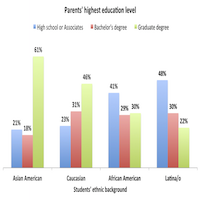
Undergraduate computing students’ parental education level differs by ethnicity
Recently, 2776 computing majors reported their parents’ highest education level on CERP’s annual Data Buddies survey.

Tag Archive: CERP Infographics
These infographics are brought to you by the CRA’s Center for Evaluating the Research Pipeline (CERP). CERP provides social science research and comparative evaluation for the computing community. To learn more about CERP, visit our website.
This material is based upon work supported by the National Science Foundation under Grant Number (CNS-1246649; DUE-1431112). Any opinions, findings, and conclusions or recommendations expressed in this material are those of the author(s) and do not necessarily reflect the views of the National Science Foundation.

Recently, 2776 computing majors reported their parents’ highest education level on CERP’s annual Data Buddies survey.
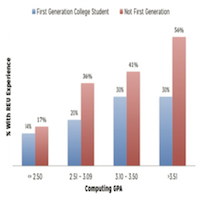
515 students who were 4th or 5th year undergraduates in computing programs reported their parental education, in-major GPA, and whether or not they had an REU during their undergraduate program. First generation college students were significantly less likely to have had an REU, even at the highest GPA levels. Other questions established that the reasons for nonparticipation were not lack of interest (first generation sophomores were equally as interested in an REU as non first generation students, 41% vs. 43%) or finances (first generation seniors who did not participate in REUs were no more likely to say that an REU didn’t pay well enough, 23% vs. 23% of those whose parents had bachelor’s degrees and 31% whose parents had graduate degrees). However, high-GPA first generation students were more likely to say that they were not aware of available research opportunities (students with GPA > 3.5, 48% of first generation students and 50% of those whose parents had bachelor’s degrees vs. 25% of those whose parents had graduate degrees). Therefore, REU programs might want to make a special outreach effort to these students to make sure that they are aware of opportunities and that they understand what is required to apply and participate.
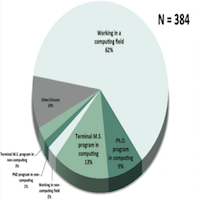
During the spring semester of 2014, we asked a sample of undergraduate students who were graduating/had graduated during the 2013-2014 academic year about their plans for the after graduation. 84% of students planned to continue pursuing computing in some capacity. The vast majority of students (62%) had plans to work in a computing field right after college. Of the full sample, only 9% planned to pursue a PhD in the field of computing.
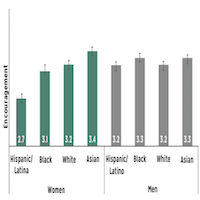
We asked undergraduate students to indicate the degree to which receiving encouragement from family, friends and teachers led them to pursue a major in computing. Among women, race mattered, p .05. Together, this finding highlights the differential experiences of students in computing as a function of gender as well as race.
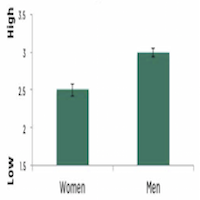
One hundred eighteen graduate students (n = 75 women, n= 143 men) indicated (a) the degree to which they endorse the stereotype that women are less capable in computing that men; (b) how much they felt they “belong” in computing and (c) their self-efficacy in computing. Men endorsed the negative stereotype to a greater degree than women, p < .01. However, among women, stronger endorsement of the negatively stereotype was associated with a lower sense of belonging and lower sense efficacy in computing, ps < .05; men’s stereotype endorsement was unrelated to their belonging and self-efficacy. These results highlight the importance of fostering a stereotype-free training environment so that women’s self-concept in computing is unconstrained by negative cultural beliefs about their ability.
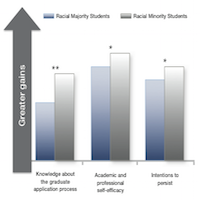
CERP recently compared critical outcomes of 187 undergraduate computing students who had participated in a formal research experience (REU) during the 2012 academic year. Students of racial minority who had participated in a REU reported greater gains in (a) knowledge about the graduate admission process, (b) academic and career self-efficacy, and (c) intentions to persist in computing compared to students of racial majority. These findings suggest that REUs in computing provide students of racial minority with an opportunity to be better prepared to apply for graduate study and develop self-efficacy. Further, formal REUs may be a particularly effective strategy for facilitating the matriculation of racial minority students through the computing pipeline.
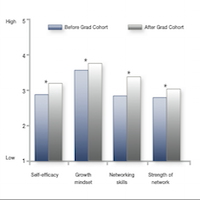
Grad Cohort is a two-day workshop that seeks to improve the success and retention of women in computing research by advising graduate students in computing on research skills and on career planning and development. Grad Cohort seeks to meet these goals using presentations, panels, and individual mentoring, and by creating professional social networks. Participants (N = 162) completed surveys prior to and immediately following the workshop. Findings suggest that Grad Cohort had a positive influence on participants’ self-reported outcomes. Participants reported greater self-efficacy, greater tendency to interpret setbacks as opportunities for growth (i.e., growth mindset), stronger networking skills, and a stronger network of colleagues after attending Grad Cohort than before. The complete Evaluation Report can be viewed at cra.org/cerp/evaluation-reports.
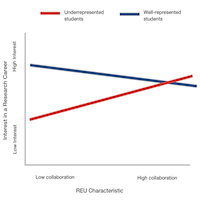
Forty four undergraduate students from underrepresented populations in computing (i.e., women + men of minority racial/ethnic groups) and 26 undergraduate students from well-represented populations in computing (i.e., Asian + White men) who had recently completed a summer NSF research experience for undergraduate students (REU) reported (a) how collaborative their REU had been and (b) interest in pursuing a research career later in life. Well-represented students reported strong interest in a research career, regardless of the degree to which their REU was collaborative. However, underrepresented students’ interest was related to the collaborative nature of their REU, such that experience with a more collaborative REUs was associated with more interest in pursuing a research career later on. This finding suggests that collaborative research environments in computing may be more important for underrepresented students’ persistence in computing research careers than is the case for well-represented students.
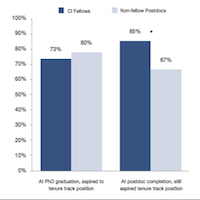
Applicants who applied to the Computing Innovation (CI) Fellowship Program in 2009, 2010, or 2011 were recruited during the fall of 2013 to complete CERP’s survey of postdoc experiences. We asked a sample of CI Fellows (n = 66) and non-fellows who had other postdoc experiences (i.e., Non-fellow Postdocs; n = 117) to reflect on their career aspirations upon completing their PhD and their career aspirations upon completing their postdoc. Both groups reported the same level of interest in pursuing a tenure track academic career upon PhD completion. Among those who had aspired to a tenure track position at upon completing their PhD, CI Fellows reported greater aspirations for being a tenure track academic after completing their postdoc relative to Non-fellow Postdocs, p < .05. These findings suggest that the CI Fellows postdoc program helped individuals maintain interest in a tenure track academic career.
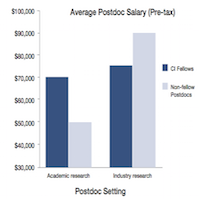
Applicants who had applied to the Computing Innovation (CI) Fellowship Program in 2009, 2010, or 2011 were recruited during the fall of 2013 to complete CERP’s survey of postdoc experiences. We compared the responses and outcomes of CI Fellows (n = 66) to non-fellows who had other postdoc experiences (i.e., Non-fellow Postdocs; n = 124). CI Fellows reported higher salaries than Non-fellow Postdocs for academic research postdocs, but lower salaries than Non-fellow Postdocs for industry research postdocs, ps < .01. In academic settings, CI Fellows found it easier to live on their postdoc salary and were more satisfied with their pay than Non-fellow Postdocs, ps < .01. In industry settings, there were no group differences in perceived adequacy of pay.
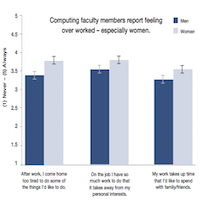
251 faculty members (82 women; 169 men) from a sample of 56 computing departments in the U.S. indicated that they feel over worked (i.e., the average response was above the midpoint). Women reported feeling significantly more overworked than men, p < .05. One explanation for this gender difference may be that women tend to take on more responsibilities outside of their normal workload than men (e.g., departmental or university service).
This website uses cookies so that we can provide you with the best user experience possible. Cookie information is stored in your browser and performs functions such as recognising you when you return to our website and helping our team to understand which sections of the website you find most interesting and useful. You can adjust all of your cookie settings.
